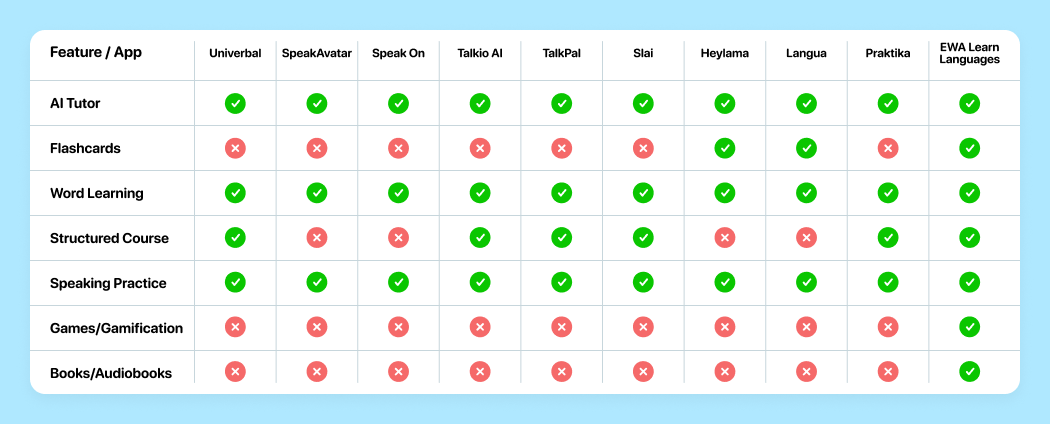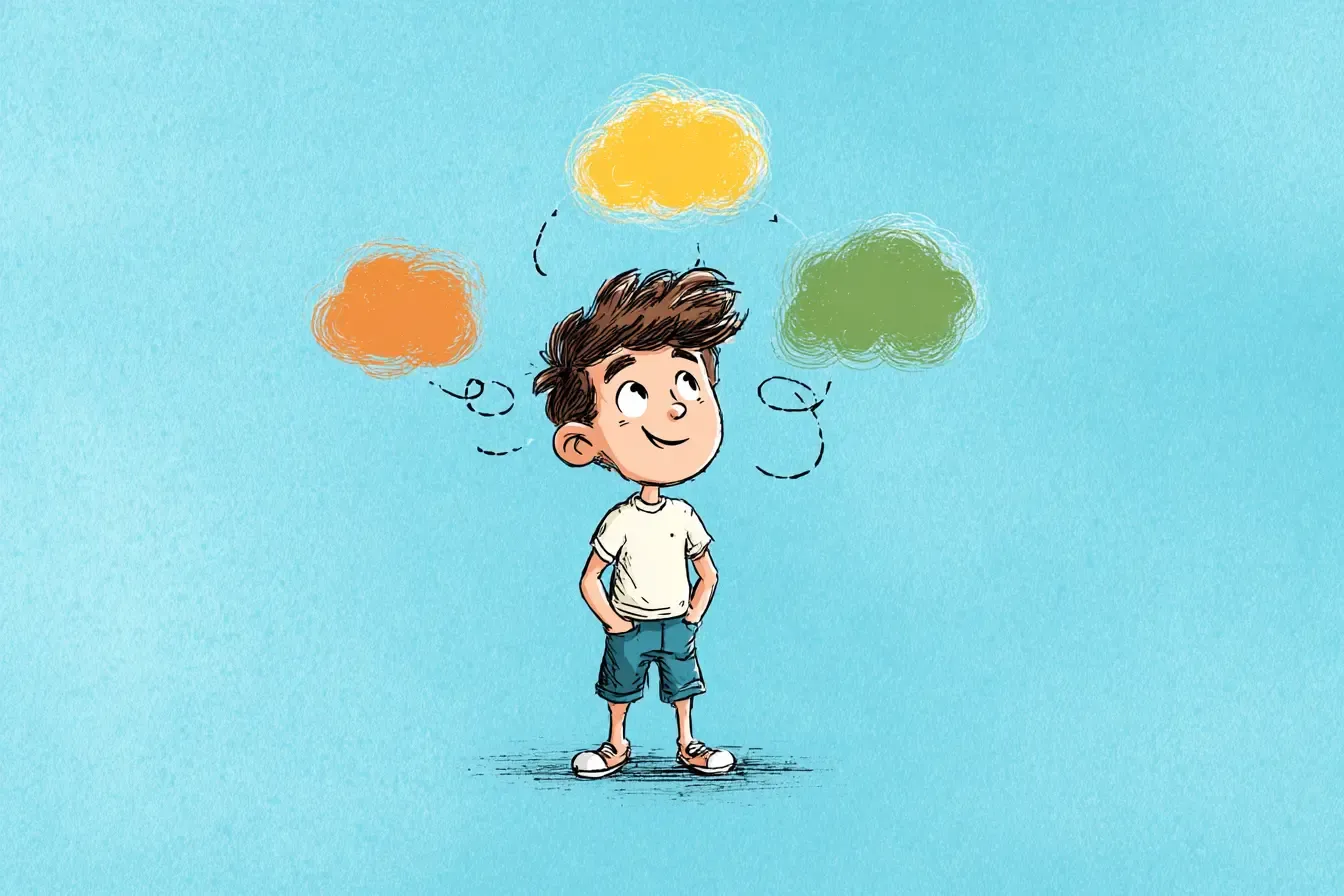AI tutors made language learning more personal. Now you can talk to a virtual teacher who will listen, correct you, and match your pace. This feature lets you practice real conversations, improve your pronunciation, and get feedback that actually helps you learn faster. Many language learning apps offer an AI tutor. Let's take a look at the best ones.
Comparison Table of the Best Apps with AI Tutors
Below you’ll find a comparative table showing the main features of today’s most popular AI tutor apps. Most of them specialize in one area, like speaking or pronunciation, but a few, like EWA, combine AI tutoring with complete language courses, reading, and games for an all-in-one learning experience.

A Closer Look at the Best Apps with AI Tutors
EWA Learn Languages
What it is: A complete language learning app powered by AI. It combines smart AI tutoring with flashcards, audiobooks, games, and courses based on real scenes from movies and TV shows.
Strengths: AI tutor is adapted for all levels (beginner, intermediate, advanced) and provides personalized speaking and grammar feedback. It also includes speaking practice in real-life situations: from ordering at a restaurant to a job interview. The platform offers 40,000+ flashcards with spaced repetition, adapted books and audiobooks for reading practice, fun games like Wordcraft and Memento, professional courses built around modern conversational language, and progress tracking with daily goals.
Limitations: No major drawbacks.
Best for: Learners who want an all-in-one app that blends AI conversation with vocabulary, listening, and cultural immersion.
Platforms: iOS, Android.
Univerbal
What it is: An AI tutor that helps you practice conversation in over 20 languages.
Strengths: Personalized learning; instant corrections on grammar and phrasing; create your own custom chat topics; adapts to your level and interests.
Limitations: Conversation quality depends on your prompts; limited offline access.
Best for: Learners who enjoy flexible, free-flowing text or voice conversations.
Platforms: iOS, Android, Web.
Talkio AI
What it is: A speaking-focused app that uses AI tutors for real voice conversations.
Strengths: Strong focus on oral fluency; accurate pronunciation feedback; supports over 40 languages; lessons adapt to your accent.
Limitations: Works best with stable internet connection; fewer grammar drills.
Best for: Learners who want to build speaking confidence and fluency.
Platforms: iOS, Android, Web.
TalkPal
What it is: A conversational AI platform offering realistic dialogues and pronunciation coaching.
Strengths: Millions of users; real-life scenarios like travel, dining, or job interviews; native-like speech feedback.
Limitations: The free version offers limited daily chats, and some advanced scenarios are locked behind a subscription.
Best for: Learners preparing for travel, interviews, or daily conversations.
Platforms: iOS, Android, Web.
Heylama
What it is: An AI-based coach that blends vocabulary, grammar, and speaking practice.
Strengths: “Tap to Talk” sessions; detects weak areas automatically; offers contextual grammar correction; includes spaced repetition for words.
Limitations: Interface feels busy for beginners; voice recognition accuracy varies by accent.
Best for: Learners who want an AI tutor that covers all skills, not just speaking.
Platforms: iOS, Android, Web.
Langua
What it is: Marketed as “Your AI Language Tutor,” Langua focuses on realistic speaking scenes and dialogues.
Strengths: Personalized situational lessons; conversation practice in daily-life contexts; adaptive feedback.
Limitations: Content mainly focuses on speaking, less on reading or writing.
Best for: Learners who want everyday conversation training through roleplays.
Platforms: iOS, Android.
SpeakAvatar
What it is: An immersive app where AI tutors appear as avatars you can talk to in real time.
Strengths: 24/7 availability; visual avatars make practice more engaging; instant pronunciation and grammar feedback.
Limitations: Requires good internet connection; avatar graphics may drain battery.
Best for: Learners who prefer a more visual, game-like learning experience.
Platforms: iOS, Android, Web.
Slai
What it is: An AI tutor with personalized lessons and real-time speaking correction.
Strengths: Clear pronunciation feedback; structured English lessons; interactive grammar and vocabulary practice.
Limitations: Currently has only English language; content depth may vary for advanced learners.
Best for: English learners looking for structured, personalized AI lessons.
Platforms: iOS, Android.
Speak On
What it is: A multi-language tutor app offering AI-guided roleplays and dialogues.
Strengths: Real-time correction on grammar, phrasing, and pronunciation; multiple languages supported; natural, friendly AI tone.
Limitations: Some voice features not yet available for all languages.
Best for: Learners who want a realistic conversation partner that feels human.
Platforms: iOS, Android, Web.
Praktika
What it is: A realistic AI avatar tutor that mimics natural human conversation.
Strengths: Uses avatars with different accents and personalities; supports voice, images, and PDFs for real-world simulations; feedback on pronunciation and tone.
Limitations: Focused mainly on speaking; fewer writing activities.
Best for: Learners who want immersive, real-life dialogue practice.
Platforms: iOS, Android.
Why AI Tutors Work: The Advantages
AI tutors are transforming the way we learn languages. They provide personalized, interactive lessons and adapt to the learner's pace and style. With an AI tutor, you get instant feedback on grammar and pronunciation, something most traditional apps can’t match.
According to studies, learners using AI-powered conversation tools show up to 2× faster improvement in speaking fluency compared to those using static exercises. Continuous feedback keeps motivation high, while realistic dialogues help reduce anxiety about real-life conversations.
FAQ
1. Are AI language tutors really better than traditional learning apps?
In many ways, they are, but traditional apps still have their own strengths. AI tutors stand out for their ability to hold real conversations, give instant feedback, and adapt lessons to your progress in real time. They’re great for improving speaking and pronunciation, and for building confidence fast.
Traditional learning apps, however, often provide more structured grammar lessons, clear progress tracking, and exercises for reading and writing. The best approach is to combine both: use an AI tutor for natural conversation practice, and a traditional app for solid grammar and vocabulary foundations.
2. Do I need to be advanced in English (or any language) to use an AI tutor?
No. Most AI tutors adapt automatically to your level, from complete beginner to fluent speaker. They detect your strengths and weaknesses, adjust the difficulty, and even translate when necessary.
3. Can AI tutors replace human teachers?
No. AI tutors are great companions, but they’re not full replacements for human teachers. A human teacher offers empathy, long-term guidance, and cultural nuance that AI still can’t fully replicate. However, AI tutors can fill the daily practice gap: they’re available 24/7 and can assist in improving pronunciation, grammar, and confidence between real lessons. The best results usually come from combining both.


















